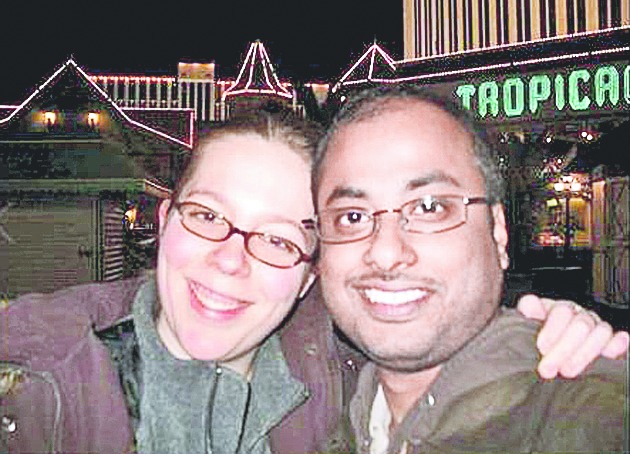
June 3: When veteran structural engineering professor Ajit Mal walks through the University of California, Los Angeles, (UCLA) campus, he is used to greetings and casual exchanges with his students.
But from 2007 till 2013, one student would stay largely aloof, even when Mal taught the then PhD scholar from India. They shared the same tongue, Bengali, but Mainak Sarkar would not even say "hello" when he crossed Mal - not even in the university gym where they both worked out.
"Maybe he was shy, or maybe he just had an attitude," Mal, a Calcutta University PhD holder, told The Telegraph on Friday from his faculty office in Los Angeles. "But I remember he usually wouldn't greet anyone."
Mainak, 38, is accused by the Los Angeles Police Department of driving 3,200km from Minneapolis to Los Angeles earlier this week to shoot dead his former PhD adviser, William Klug, before killing himself. Mainak is also accused of killing Ashley Hasti, his estranged wife.
Mainak had in a blog post accused Klug of stealing his computer "code" and had warned future students to stay away from the professor.
But interviews with other teachers and friends suggest the professor was intensely popular with students and colleagues and went out of his way to help them.
They also indicate that Mainak was a bright student who, though lonely, never visibly showed signs of mental illness while pursuing his PhD at the university.
"There was nothing extraordinary about him at all," Himadri Samajder, then a fellow PhD student at UCLA's mechanical engineering department, recalled from his interactions with Mainak. "There was nothing there that would make anyone think he could do something like this."
Klug too could never have imagined facing a student's bullets, his friends suggest.
Klug had arrived at the UCLA campus in the avatar of a faculty member in 2003, three years before Mainak joined the PhD programme. If it was an Indian who cut Klug's life short, another Indian - Mal - had played a role in bringing him to the UCLA faculty.
Klug had obtained his master's from UCLA, and then a PhD from Caltech. When he applied for an assistant professor's position, Mal, already a veteran of the department at the time, pushed for his hire.
"He was very bright, and I knew he would be a very good choice," Mal recalled.
Soon, Mal became a mentor of sorts to Klug as the protégé found his way as a teacher. But by 2005, Klug was a confident teacher who had earned the respect of his students, Mal said.
Klug made students feel comfortable, Mal said. "If a student was struggling, he would sit him down and tell him to relax and take it easy, not stress over it," Mal said. "Students loved him."
In 2015, Klug became a full-fledged professor. By then, he had established a successful research group that worked in the interdisciplinary fields of biology, mechanics and computing. Mainak was a part of that group - as were two other Indian students - till he earned his PhD in 2013.
Two days after the shooting, Shankarjee Krishnamoorthi, one of the other Indian students who was in Klug's research group till he completed his PhD, said he was still too stunned to speak.
"I am still reeling from the shock and in my present state I don't want to talk about it," Krishnamoorthi wrote in an email to this newspaper from Charlotte, North Carolina, where he now works as a senior engineer with Sealed Air Corporation, the packaging major. "In my present state I don't want to talk about it. I hope you understand my feelings."
Ankush Aggarwal, the third of the Indians who worked on Klug's research team, is now teaching at Swansea University in the UK. Aggarwal did not respond to telephone calls.
Klug's appeal extended beyond those he advised during their PhDs.
"He wasn't my adviser but I considered him my mentor," Samajder told this newspaper. "I was very close to him"
Colleagues too have fond memories of Klug. Mal said Klug was always willing to join any research he proposed, without any hesitation.
Academically, Sarkar, just a year younger than Klug, was bright too. In 2008, he took a class on non-linear elasticity, taught by Mal. He scored an 'A.'
"He was good," Mal recalled.
Most students under Klug took longer than usual to complete their PhDs because of the complexities of inter-disciplinary research, Mal said. Sarkar was no different - he took seven years to finish.
Sarkar was also a frequent visitor to the campus gym, where Mal would see him when he went. But after Sarkar completed his PhD, Mal never saw him on campus.
Samajder, who now works at the UCLA medical school, said Sarkar was an acquaintance he spoke with occasionally after he joined the PhD programme in 2008, two years after Sarkar. Both spoke Bengali, and would converse in the language when it was just the two of them - Sarkar was from Bengal, Samajjdar is from Noida.
Sarkar did not have many friends, Samajder and Mal both recalled. Occasionally, Mal said, Sarkar would hang out with some of his PhD students.
"Otherwise, he was a normal Bengali boy," Mal said.











